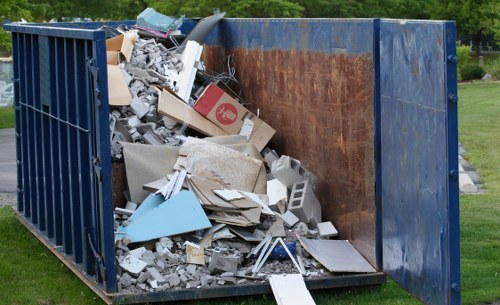Council Waste Collection in Waste Recycling
Understanding Council Waste Collection

Effective waste management is a cornerstone of sustainable communities. Council waste collection plays a pivotal role in ensuring that waste is handled responsibly, reducing environmental impact, and promoting recycling efforts. By understanding how council waste collection operates, residents can better participate in recycling initiatives and contribute to a greener future.
Council waste collection encompasses a variety of services aimed at managing household and commercial waste. These services are designed to collect, transport, and process waste in ways that minimize environmental harm and maximize recycling potential. The success of these programs relies heavily on community participation and adherence to local guidelines.
Municipalities typically provide different types of waste collection services to cater to the diverse needs of their populations. These services include regular trash pickup, recycling collection, and special waste disposal for items like electronics and hazardous materials. Understanding the distinctions between these services helps residents properly sort and dispose of their waste, enhancing the efficiency of recycling processes.
The Role of Waste Recycling in Environmental Sustainability

_Recycling_ is a critical component of waste management strategies aimed at reducing the strain on natural resources and lowering greenhouse gas emissions. By transforming waste materials into reusable products, recycling helps conserve energy and decrease the need for raw material extraction. This not only contributes to environmental sustainability but also fosters economic growth through the creation of green jobs.
The benefits of waste recycling extend beyond environmental protection. Recycling initiatives can lead to significant cost savings for municipalities by reducing the volume of waste that needs to be processed in landfills. Additionally, recycling programs can stimulate local economies by creating markets for recycled materials and encouraging innovation in recycling technologies.
The process of recycling waste typically involves several stages, including collection, sorting, processing, and manufacturing into new products. Each stage requires careful management to ensure that recyclable materials are effectively repurposed and that non-recyclable materials are responsibly disposed of. Efficient recycling processes contribute to the overall success of waste management programs and help communities achieve their sustainability goals.
How Council Waste Collection Supports Recycling Initiatives

Council waste collection services are instrumental in supporting local recycling initiatives. By providing convenient and accessible recycling options, councils encourage residents to participate actively in recycling efforts. This participation is crucial for the success of recycling programs and the achievement of broader environmental objectives.
Separation of recyclables at the source is a fundamental practice encouraged by many council waste collection services. By separating materials such as paper, plastics, glass, and metals from general waste, residents can significantly increase the efficiency of recycling processes. Councils often provide separate bins and clear guidelines to facilitate proper waste separation.
Additionally, councils play a vital role in community education programs that raise awareness about the importance of recycling and provide practical tips for effective waste management. These programs aim to empower residents with the knowledge and tools needed to make informed decisions about their waste disposal practices.
Challenges in Council Waste Collection and Recycling

Despite the numerous benefits of council waste collection and recycling programs, several challenges can impede their effectiveness. Addressing these challenges requires a collaborative effort between councils, businesses, and residents to find innovative solutions and improve overall waste management practices.
Contamination of recyclables is a common issue that undermines recycling efforts. When non-recyclable materials are mixed with recyclables, it can lead to processing difficulties and reduce the quality of recycled products. Councils must implement strict guidelines and provide education to minimize contamination and ensure that only appropriate materials are recycled.
Another significant challenge is securing adequate funding and resources for waste management programs. Effective recycling requires investment in infrastructure, technology, and personnel. Councils must prioritize waste management in their budgets and seek alternative funding sources to maintain and expand recycling services.
Best Practices for Effective Waste Collection and Recycling

Implementing best practices in waste collection and recycling is essential for maximizing the efficiency and impact of these programs. Councils and residents alike can adopt strategies that enhance waste management processes and promote sustainable behaviors.
Proper sorting techniques are fundamental to successful recycling. Councils should provide clear instructions on how to sort different types of waste and ensure that collection systems support these practices. For example, color-coded bins and labeled containers can help residents easily identify where each type of waste should be disposed of.
Moreover, reducing waste generation at the source is a proactive approach that complements recycling efforts. By encouraging the use of reusable products, composting organic waste, and minimizing single-use items, councils can significantly decrease the overall volume of waste that needs to be managed.
Future of Council Waste Collection and Recycling

The future of council waste collection and recycling lies in innovation and adaptability. As communities grow and environmental challenges evolve, waste management strategies must also advance to meet new demands and opportunities.
Innovations in waste management technologies, such as advanced sorting systems and waste-to-energy solutions, hold promise for enhancing the efficiency and sustainability of recycling programs. Councils that invest in cutting-edge technologies can improve their waste processing capabilities and reduce reliance on landfills.
Policy and regulation changes will also play a crucial role in shaping the future of waste collection and recycling. Stronger regulations can drive higher recycling rates, encourage the development of sustainable materials, and promote circular economy practices. Councils must stay informed about policy developments and proactively implement measures that support long-term sustainability goals.
In conclusion, council waste collection is a vital element of waste recycling efforts that contribute to environmental sustainability and community well-being. By understanding the intricacies of waste management services, supporting recycling initiatives, overcoming challenges, and adopting best practices, communities can achieve significant strides toward a greener and more sustainable future. Contact us today to learn more about how you can participate in our waste recycling programs and make a positive impact on the environment.